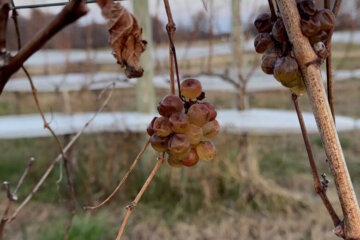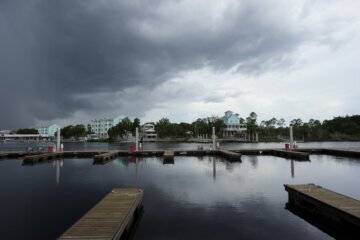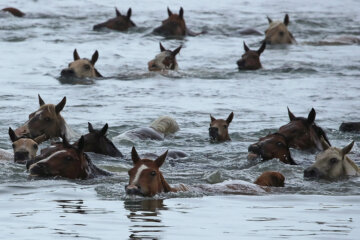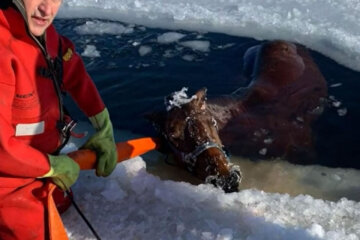 View Video
View Video
February 13th, 2026, 02:35 PM EST
A doggy play date in a North Carolina pond turned tragic after three pups died from toxic algae. Now, their owners say they hope their loss will educate fellow dog lovers about the dangerous blooms.
Melissa Martin and Denise Mintz took their beloved dogs Abby, Izzy and Harpo to a pond in Wilmington on Thursday night to cool off. But within 15 minutes of leaving the pond, Abby, a West Highland white terrier, began to have a seizure.
Martin rushed her to a veterinary hospital, with Izzy and Harpo right behind her. Upon their arrival, Izzy, also a Westie, started seizing, and both terriers rapidly declined. Then Harpo, her 6-year-old “doodle” mixtherapy dog, began to seize and show signs of liver failure.
By midnight Friday, all three dogs had died, she said.
The culprit, Martin’s veterinarian said, was poisoning from blue-green algae present in the pond where they played.
“What started out as a fun night for them has ended in the biggest loss of our lives,” Martin wrote in a Facebook post that has since been shared more than 15,000 times.
Martin told CNN she didn’t notice the algae at first, but her veterinarian told her that what appeared to be debris from flowers were blooms of cyanobacteria.
She said she didn’t see any signs warning of toxic algae near the pond, which sits next to a popular walking trail. It’s her mission now, she says, to erect signs about toxic waters and warn pet owners about the blooms.
“I will not stop until I make positive change,” she said. “I will not lose my dogs for nothing.”
Toxic algae blooms are more likely to infest bodies of fresh water when the weather is warm and waters are stagnant, according to the North Carolina Department of Health and Human Services.
Some algal blooms leave a film of muck on the surface and make the water ruddy, but others are difficult to immediately detect, such as the blooms in the pond where Martin’s dogs were exposed.
There’s no cure for the poisoning, and exposure nearly always leads to death in dogs. Drinking from a body of water where blue-green algae lurks or licking it off fur can kill a dog within 15 minutes of exposure, according to Blue Cross for Pets, a UK animal charity.
The North Carolina Department of Environmental Quality periodically updates a map of the state where algae blooms have been reported, but in the case that a health notice isn’t posted, it’s best for humans and pets alike to avoid waters that smell bad or look odd in color or murky, the state’s health and human services department said.
 View Video
View Video
February 13th, 2026, 02:35 PM EST
 View Video
View Video
January 17th, 2026, 08:08 AM EST
 View Video
View Video
November 25th, 2025, 12:14 PM EST
 View Video
View Video
November 20th, 2025, 10:35 AM EST
 View Video
View Video
November 12th, 2025, 03:09 PM EST
 View Video
View Video
November 4th, 2025, 10:18 PM EST
 View Video
View Video
October 16th, 2025, 02:36 PM EDT
 View Video
View Video
September 18th, 2025, 06:14 PM EDT
 View Video
View Video
September 11th, 2025, 08:30 AM EDT
 View Video
View Video
September 3rd, 2025, 01:40 PM EDT
 View Video
View Video
September 2nd, 2025, 12:22 PM EDT
 View Video
View Video
August 4th, 2025, 10:35 AM EDT
 View Video
View Video
July 29th, 2025, 06:01 PM EDT
 View Video
View Video
July 3rd, 2025, 01:17 PM EDT
 View Video
View Video
May 6th, 2025, 04:31 PM EDT
 View Video
View Video
April 14th, 2025, 05:24 PM EDT
 View Video
View Video
January 20th, 2025, 04:03 PM EST
 View Video
View Video
January 16th, 2025, 04:44 AM EST
 View Video
View Video
January 7th, 2025, 04:08 PM EST
 View Video
View Video
November 11th, 2024, 11:13 AM EST
 View Video
View Video
November 7th, 2024, 10:38 AM EST
 View Video
View Video
October 10th, 2024, 04:55 PM EDT
 View Video
View Video
October 2nd, 2024, 06:48 AM EDT
 View Video
View Video
July 24th, 2024, 01:06 PM EDT
 View Video
View Video
July 23rd, 2024, 04:28 AM EDT
 View Video
View Video
July 13th, 2024, 11:13 PM EDT
 View Video
View Video
July 11th, 2024, 05:54 AM EDT
 View Video
View Video
June 11th, 2024, 06:15 AM EDT
 View Video
View Video
May 30th, 2024, 05:59 PM EDT
 View Video
View Video
May 9th, 2024, 01:23 PM EDT
 View Video
View Video
May 9th, 2024, 05:38 AM EDT
 View Video
View Video
March 14th, 2024, 05:01 AM EDT
 View Video
View Video
February 8th, 2024, 05:22 AM EST
 View Video
View Video
January 30th, 2024, 12:50 PM EST
 View Video
View Video
January 15th, 2024, 02:04 PM EST
 View Video
View Video
December 14th, 2023, 07:45 AM EST
 View Video
View Video
December 5th, 2023, 07:37 AM EST
 View Video
View Video
November 28th, 2023, 04:58 AM EST
 View Video
View Video
November 21st, 2023, 04:54 AM EST
 View Video
View Video
November 16th, 2023, 05:39 AM EST
 View Video
View Video
November 7th, 2023, 04:05 AM EST
 View Video
View Video
November 2nd, 2023, 05:01 AM EDT
 View Video
View Video
October 26th, 2023, 04:53 AM EDT
 View Video
View Video
October 24th, 2023, 04:39 AM EDT
 View Video
View Video
October 20th, 2023, 05:10 AM EDT
 View Video
View Video
October 19th, 2023, 07:39 AM EDT
 View Video
View Video
August 30th, 2023, 11:49 AM EDT
 View Video
View Video
July 27th, 2023, 10:34 AM EDT
 View Video
View Video
June 15th, 2023, 01:21 PM EDT
 View Video
View Video
April 4th, 2023, 07:24 PM EDT
 View Video
View Video
March 29th, 2023, 07:19 PM EDT
 View Video
View Video
March 23rd, 2023, 05:55 AM EDT
 View Video
View Video
March 14th, 2023, 05:51 PM EDT
 View Video
View Video
March 8th, 2023, 05:56 PM EST
 View Video
View Video
March 1st, 2023, 06:27 PM EST
 View Video
View Video
February 23rd, 2023, 05:56 PM EST
 View Video
View Video
February 16th, 2023, 05:34 PM EST
 View Video
View Video
February 8th, 2023, 05:47 PM EST
 View Video
View Video
February 8th, 2023, 04:45 AM EST
 View Video
View Video
January 31st, 2023, 05:36 PM EST
 View Video
View Video
January 25th, 2023, 05:47 PM EST
 View Video
View Video
January 18th, 2023, 06:09 PM EST
 View Video
View Video
January 10th, 2023, 05:46 PM EST
 View Video
View Video
January 6th, 2023, 01:44 PM EST
 View Video
View Video
January 5th, 2023, 05:26 PM EST
 View Video
View Video
January 3rd, 2023, 08:12 AM EST
 View Video
View Video
December 29th, 2022, 05:06 PM EST
 View Video
View Video
December 26th, 2022, 10:23 AM EST
 View Video
View Video
December 22nd, 2022, 10:24 AM EST
 View Video
View Video
December 20th, 2022, 08:06 AM EST
 View Video
View Video
December 8th, 2022, 07:33 AM EST
 View Video
View Video
December 7th, 2022, 06:10 PM EST
 View Video
View Video
December 6th, 2022, 09:35 AM EST
 View Video
View Video
December 2nd, 2022, 12:03 PM EST
 View Video
View Video
November 22nd, 2022, 04:57 PM EST
 View Video
View Video
November 15th, 2022, 11:02 PM EST
 View Video
View Video
November 9th, 2022, 07:21 PM EST
 View Video
View Video
November 3rd, 2022, 06:00 PM EDT
 View Video
View Video
November 2nd, 2022, 06:49 PM EDT
 View Video
View Video
October 27th, 2022, 05:39 PM EDT
 View Video
View Video
October 25th, 2022, 09:26 AM EDT
 View Video
View Video
October 25th, 2022, 09:24 AM EDT
 View Video
View Video
October 20th, 2022, 07:41 PM EDT
 View Video
View Video
October 14th, 2022, 05:16 PM EDT
 View Video
View Video
October 6th, 2022, 06:10 PM EDT
 View Video
View Video
September 29th, 2022, 05:42 PM EDT
 View Video
View Video
September 22nd, 2022, 05:59 PM EDT
 View Video
View Video
September 22nd, 2022, 11:22 AM EDT
 View Video
View Video
September 15th, 2022, 04:58 PM EDT
 View Video
View Video
September 8th, 2022, 04:48 PM EDT
 View Video
View Video
August 31st, 2022, 04:51 PM EDT
 View Video
View Video
August 25th, 2022, 05:23 PM EDT
 View Video
View Video
August 18th, 2022, 04:08 PM EDT
 View Video
View Video
August 17th, 2022, 08:28 PM EDT
 View Video
View Video
August 17th, 2022, 10:21 AM EDT
 View Video
View Video
August 11th, 2022, 04:50 PM EDT
 View Video
View Video
August 3rd, 2022, 05:19 PM EDT
 View Video
View Video
August 1st, 2022, 06:37 PM EDT
 View Video
View Video
July 27th, 2022, 05:39 PM EDT
 View Video
View Video
July 20th, 2022, 04:20 PM EDT
 View Video
View Video
July 18th, 2022, 08:48 AM EDT
 View Video
View Video
July 6th, 2022, 03:45 PM EDT
 View Video
View Video
June 30th, 2022, 11:44 AM EDT
 View Video
View Video
June 29th, 2022, 04:23 PM EDT
 View Video
View Video
June 25th, 2022, 06:20 PM EDT
 View Video
View Video
June 24th, 2022, 11:59 PM EDT
 View Video
View Video
June 22nd, 2022, 06:18 PM EDT
 View Video
View Video
June 17th, 2022, 01:00 AM EDT
 View Video
View Video
June 15th, 2022, 04:48 PM EDT
 View Video
View Video
June 8th, 2022, 05:45 PM EDT
 View Video
View Video
June 1st, 2022, 06:13 PM EDT
 View Video
View Video
June 1st, 2022, 02:44 PM EDT
 View Video
View Video
May 13th, 2022, 12:05 AM EDT
 View Video
View Video
May 2nd, 2022, 02:33 PM EDT
 View Video
View Video
April 27th, 2022, 05:16 PM EDT
 View Video
View Video
April 21st, 2022, 08:40 AM EDT
 View Video
View Video
April 20th, 2022, 06:04 PM EDT
 View Video
View Video
April 13th, 2022, 05:23 PM EDT
 View Video
View Video
April 6th, 2022, 05:23 PM EDT
 View Video
View Video
April 5th, 2022, 06:22 PM EDT
 View Video
View Video
March 24th, 2022, 08:28 AM EDT
 View Video
View Video
March 24th, 2022, 01:45 AM EDT
 View Video
View Video
March 23rd, 2022, 03:42 PM EDT
 View Video
View Video
March 22nd, 2022, 09:30 PM EDT
 View Video
View Video
March 9th, 2022, 04:12 PM EST
 View Video
View Video
March 2nd, 2022, 05:27 PM EST
 View Video
View Video
February 23rd, 2022, 06:16 PM EST
 View Video
View Video
February 16th, 2022, 05:10 PM EST
 View Video
View Video
February 9th, 2022, 06:32 PM EST
 View Video
View Video
February 9th, 2022, 04:12 AM EST
 View Video
View Video
February 3rd, 2022, 10:13 AM EST
 View Video
View Video
February 2nd, 2022, 06:43 PM EST
 View Video
View Video
February 2nd, 2022, 07:52 AM EST
 View Video
View Video
January 26th, 2022, 05:29 PM EST
 View Video
View Video
January 19th, 2022, 07:09 PM EST
 View Video
View Video
January 12th, 2022, 04:02 PM EST
 View Video
View Video
January 6th, 2022, 04:57 PM EST
 View Video
View Video
January 5th, 2022, 06:40 PM EST
 View Video
View Video
December 22nd, 2021, 02:54 PM EST
 View Video
View Video
December 22nd, 2021, 02:40 PM EST
 View Video
View Video
December 15th, 2021, 06:52 PM EST
 View Video
View Video
December 15th, 2021, 05:52 PM EST
 View Video
View Video
December 9th, 2021, 06:50 AM EST
 View Video
View Video
December 8th, 2021, 05:55 PM EST
 View Video
View Video
December 3rd, 2021, 07:51 AM EST
 View Video
View Video
December 1st, 2021, 06:16 PM EST
 View Video
View Video
November 24th, 2021, 06:23 PM EST
 View Video
View Video
November 17th, 2021, 06:59 PM EST
 View Video
View Video
November 10th, 2021, 06:39 PM EST
 View Video
View Video
November 3rd, 2021, 06:45 PM EDT
 View Video
View Video
October 27th, 2021, 08:22 PM EDT
 View Video
View Video
October 13th, 2021, 05:44 PM EDT
 View Video
View Video
October 6th, 2021, 05:06 PM EDT
 View Video
View Video
September 29th, 2021, 02:31 PM EDT
 View Video
View Video
September 22nd, 2021, 05:44 PM EDT
 View Video
View Video
September 21st, 2021, 05:24 PM EDT
 View Video
View Video
September 15th, 2021, 04:50 PM EDT
 View Video
View Video
September 13th, 2021, 10:48 AM EDT
 View Video
View Video
September 8th, 2021, 04:20 PM EDT
 View Video
View Video
September 7th, 2021, 09:30 PM EDT
 View Video
View Video
September 1st, 2021, 02:12 PM EDT
 View Video
View Video
August 24th, 2021, 02:15 PM EDT
 View Video
View Video
August 17th, 2021, 12:33 PM EDT
 View Video
View Video
August 10th, 2021, 02:40 PM EDT
 View Video
View Video
August 3rd, 2021, 02:01 PM EDT
 View Video
View Video
July 27th, 2021, 03:06 PM EDT
 View Video
View Video
July 20th, 2021, 01:08 PM EDT
 View Video
View Video
July 13th, 2021, 01:14 PM EDT
 View Video
View Video
July 6th, 2021, 01:56 PM EDT
 View Video
View Video
June 29th, 2021, 02:27 PM EDT
 View Video
View Video
June 25th, 2021, 06:52 PM EDT
 View Video
View Video
June 25th, 2021, 08:13 AM EDT
 View Video
View Video
June 25th, 2021, 08:02 AM EDT
 View Video
View Video
June 25th, 2021, 07:46 AM EDT
 View Video
View Video
June 8th, 2021, 02:03 PM EDT
 View Video
View Video
May 25th, 2021, 03:16 PM EDT
 View Video
View Video
May 11th, 2021, 02:00 PM EDT
 View Video
View Video
May 5th, 2021, 08:38 AM EDT
 View Video
View Video
May 5th, 2021, 06:35 AM EDT
 View Video
View Video
May 4th, 2021, 02:21 PM EDT
 View Video
View Video
April 27th, 2021, 03:29 PM EDT
 View Video
View Video
April 21st, 2021, 09:31 AM EDT
 View Video
View Video
April 20th, 2021, 02:36 PM EDT
 View Video
View Video
April 14th, 2021, 09:39 AM EDT
 View Video
View Video
April 13th, 2021, 02:36 PM EDT
 View Video
View Video
March 23rd, 2021, 03:41 PM EDT
 View Video
View Video
March 16th, 2021, 02:36 PM EDT
 View Video
View Video
March 11th, 2021, 09:05 PM EST
 View Video
View Video
March 9th, 2021, 02:08 PM EST
 View Video
View Video
March 4th, 2021, 08:09 AM EST
 View Video
View Video
March 3rd, 2021, 09:31 AM EST
 View Video
View Video
March 2nd, 2021, 09:10 AM EST
 View Video
View Video
February 25th, 2021, 09:45 AM EST
 View Video
View Video
February 23rd, 2021, 02:38 PM EST
 View Video
View Video
February 22nd, 2021, 03:19 PM EST
 View Video
View Video
February 16th, 2021, 03:09 PM EST
 View Video
View Video
February 10th, 2021, 07:45 PM EST
 View Video
View Video
February 3rd, 2021, 07:38 AM EST
 View Video
View Video
February 2nd, 2021, 09:25 PM EST
 View Video
View Video
February 2nd, 2021, 03:14 PM EST
 View Video
View Video
January 26th, 2021, 03:13 PM EST
 View Video
View Video
January 21st, 2021, 08:31 AM EST
 View Video
View Video
January 20th, 2021, 11:00 PM EST
 View Video
View Video
January 19th, 2021, 03:47 PM EST
 View Video
View Video
January 12th, 2021, 02:58 PM EST
 View Video
View Video
January 12th, 2021, 08:51 AM EST
 View Video
View Video
December 29th, 2020, 09:29 PM EST
 View Video
View Video
December 22nd, 2020, 08:56 PM EST
 View Video
View Video
December 18th, 2020, 09:17 AM EST
 View Video
View Video
December 18th, 2020, 03:51 AM EST
 View Video
View Video
December 17th, 2020, 07:27 AM EST
 View Video
View Video
December 16th, 2020, 02:07 AM EST
 View Video
View Video
December 14th, 2020, 07:29 PM EST
 View Video
View Video
December 8th, 2020, 02:18 PM EST
 View Video
View Video
December 4th, 2020, 04:53 PM EST
 View Video
View Video
December 1st, 2020, 04:52 PM EST
 View Video
View Video
December 1st, 2020, 04:32 PM EST
 View Video
View Video
December 1st, 2020, 06:43 AM EST
 View Video
View Video
November 17th, 2020, 08:17 PM EST
 View Video
View Video
November 16th, 2020, 07:18 PM EST
 View Video
View Video
November 10th, 2020, 09:21 PM EST
 View Video
View Video
November 6th, 2020, 11:19 AM EST
 View Video
View Video
November 2nd, 2020, 10:46 AM EST
 View Video
View Video
October 28th, 2020, 08:52 AM EDT
 View Video
View Video
October 25th, 2020, 07:59 AM EDT
 View Video
View Video
October 22nd, 2020, 10:52 PM EDT
 View Video
View Video
October 20th, 2020, 08:13 PM EDT
 View Video
View Video
October 16th, 2020, 11:31 PM EDT
 View Video
View Video
October 14th, 2020, 08:31 AM EDT
 View Video
View Video
October 13th, 2020, 09:11 PM EDT
 View Video
View Video
October 12th, 2020, 07:27 AM EDT
 View Video
View Video
October 7th, 2020, 10:19 PM EDT
 View Video
View Video
September 29th, 2020, 11:13 PM EDT
 View Video
View Video
September 25th, 2020, 03:36 PM EDT
 View Video
View Video
September 24th, 2020, 08:59 AM EDT
 View Video
View Video
September 24th, 2020, 08:12 AM EDT
 View Video
View Video
September 24th, 2020, 02:09 AM EDT
 View Video
View Video
September 23rd, 2020, 12:16 PM EDT
 View Video
View Video
September 17th, 2020, 02:14 PM EDT
 View Video
View Video
August 25th, 2020, 11:12 AM EDT
 View Video
View Video
August 21st, 2020, 08:19 AM EDT
 View Video
View Video
August 14th, 2020, 11:22 AM EDT
 View Video
View Video
August 14th, 2020, 05:38 AM EDT
 View Video
View Video
August 12th, 2020, 01:40 PM EDT
 View Video
View Video
July 31st, 2020, 03:10 PM EDT
 View Video
View Video
July 31st, 2020, 02:01 PM EDT
 View Video
View Video
July 31st, 2020, 01:00 PM EDT
 View Video
View Video
July 28th, 2020, 03:57 PM EDT
 View Video
View Video
July 27th, 2020, 10:30 PM EDT
 View Video
View Video
July 26th, 2020, 10:50 AM EDT
 View Video
View Video
July 25th, 2020, 06:45 PM EDT
 View Video
View Video
July 20th, 2020, 11:21 AM EDT
 View Video
View Video
July 20th, 2020, 08:44 AM EDT
 View Video
View Video
July 19th, 2020, 08:47 PM EDT
 View Video
View Video
June 26th, 2020, 09:34 AM EDT
 View Video
View Video
June 11th, 2020, 04:08 AM EDT
 View Video
View Video
June 10th, 2020, 02:57 PM EDT
 View Video
View Video
June 10th, 2020, 01:34 PM EDT
 View Video
View Video
June 9th, 2020, 12:56 AM EDT
 View Video
View Video
June 6th, 2020, 02:04 PM EDT
 View Video
View Video
June 2nd, 2020, 11:22 AM EDT
 View Video
View Video
May 29th, 2020, 11:01 AM EDT
 View Video
View Video
May 20th, 2020, 01:51 PM EDT
 View Video
View Video
May 19th, 2020, 01:15 PM EDT
 View Video
View Video
May 12th, 2020, 07:32 AM EDT
 View Video
View Video
May 5th, 2020, 02:24 PM EDT
 View Video
View Video
May 5th, 2020, 01:22 AM EDT
 View Video
View Video
May 4th, 2020, 10:14 PM EDT
 View Video
View Video
May 1st, 2020, 02:09 PM EDT
 View Video
View Video
April 29th, 2020, 09:52 AM EDT
 View Video
View Video
April 28th, 2020, 10:34 PM EDT
 View Video
View Video
April 28th, 2020, 11:56 AM EDT
 View Video
View Video
April 27th, 2020, 06:01 AM EDT
 View Video
View Video
April 15th, 2020, 03:49 PM EDT
 View Video
View Video
April 15th, 2020, 03:48 PM EDT
 View Video
View Video
April 14th, 2020, 01:07 PM EDT
 View Video
View Video
April 14th, 2020, 10:13 AM EDT
 View Video
View Video
April 13th, 2020, 05:49 PM EDT
 View Video
View Video
April 12th, 2020, 10:32 AM EDT
 View Video
View Video
April 10th, 2020, 05:13 AM EDT
 View Video
View Video
April 9th, 2020, 09:36 AM EDT
 View Video
View Video
April 3rd, 2020, 03:26 PM EDT
 View Video
View Video
March 30th, 2020, 09:58 AM EDT
 View Video
View Video
March 24th, 2020, 01:54 AM EDT
 View Video
View Video
March 23rd, 2020, 09:31 PM EDT
 View Video
View Video
March 23rd, 2020, 07:38 PM EDT
 View Video
View Video
March 20th, 2020, 10:47 AM EDT
 View Video
View Video
March 19th, 2020, 10:27 AM EDT
 View Video
View Video
March 18th, 2020, 10:51 AM EDT
 View Video
View Video
March 17th, 2020, 12:45 PM EDT
 View Video
View Video
March 17th, 2020, 10:39 AM EDT
 View Video
View Video
March 17th, 2020, 12:43 AM EDT
 View Video
View Video
March 11th, 2020, 07:23 PM EDT
 View Video
View Video
March 9th, 2020, 09:56 AM EDT
 View Video
View Video
March 9th, 2020, 08:35 AM EDT
 View Video
View Video
March 8th, 2020, 04:02 AM EDT
 View Video
View Video
February 28th, 2020, 10:32 AM EST
 View Video
View Video
February 26th, 2020, 05:21 PM EST
 View Video
View Video
February 25th, 2020, 06:24 PM EST
 View Video
View Video
February 21st, 2020, 07:45 AM EST
 View Video
View Video
February 20th, 2020, 08:17 AM EST
 View Video
View Video
February 20th, 2020, 06:51 AM EST
 View Video
View Video
February 19th, 2020, 09:03 PM EST
 View Video
View Video
February 19th, 2020, 10:02 AM EST
 View Video
View Video
February 14th, 2020, 03:30 PM EST
 View Video
View Video
February 13th, 2020, 07:20 AM EST
 View Video
View Video
February 13th, 2020, 07:18 AM EST
 View Video
View Video
February 12th, 2020, 11:22 AM EST
 View Video
View Video
February 12th, 2020, 10:35 AM EST
 View Video
View Video
February 12th, 2020, 07:17 AM EST
 View Video
View Video
February 11th, 2020, 02:56 PM EST
 View Video
View Video
February 11th, 2020, 11:53 AM EST
 View Video
View Video
February 7th, 2020, 06:06 PM EST
 View Video
View Video
February 5th, 2020, 11:05 AM EST
 View Video
View Video
February 3rd, 2020, 05:00 PM EST
 View Video
View Video
February 2nd, 2020, 07:30 AM EST
 View Video
View Video
January 29th, 2020, 12:19 PM EST
 View Video
View Video
January 29th, 2020, 07:41 AM EST
 View Video
View Video
January 26th, 2020, 05:35 PM EST
 View Video
View Video
January 25th, 2020, 09:36 AM EST
 View Video
View Video
January 19th, 2020, 03:18 PM EST
 View Video
View Video
January 17th, 2020, 01:26 PM EST
 View Video
View Video
January 16th, 2020, 12:25 PM EST
 View Video
View Video
January 15th, 2020, 09:50 AM EST
 View Video
View Video
January 10th, 2020, 10:09 AM EST
 View Video
View Video
January 9th, 2020, 10:57 AM EST
 View Video
View Video
January 7th, 2020, 02:23 PM EST
 View Video
View Video
January 7th, 2020, 11:57 AM EST
 View Video
View Video
January 7th, 2020, 09:43 AM EST
 View Video
View Video
January 7th, 2020, 01:37 AM EST
 View Video
View Video
January 2nd, 2020, 02:49 PM EST
 View Video
View Video
January 2nd, 2020, 11:39 AM EST
 View Video
View Video
January 1st, 2020, 04:40 PM EST
 View Video
View Video
January 1st, 2020, 06:41 AM EST
 View Video
View Video
December 31st, 2019, 10:46 AM EST
 View Video
View Video
December 31st, 2019, 10:15 AM EST
 View Video
View Video
December 30th, 2019, 03:39 PM EST
 View Video
View Video
December 30th, 2019, 12:11 PM EST
 View Video
View Video
December 24th, 2019, 10:32 AM EST
 View Video
View Video
December 13th, 2019, 08:26 AM EST
 View Video
View Video
December 12th, 2019, 07:56 AM EST
 View Video
View Video
December 11th, 2019, 05:35 PM EST
 View Video
View Video
December 10th, 2019, 08:28 AM EST
 View Video
View Video
December 5th, 2019, 08:33 AM EST
 View Video
View Video
December 4th, 2019, 07:51 AM EST
 View Video
View Video
December 4th, 2019, 03:18 AM EST
 View Video
View Video
December 2nd, 2019, 10:21 AM EST
 View Video
View Video
November 25th, 2019, 08:00 PM EST
 View Video
View Video
November 22nd, 2019, 03:15 PM EST
 View Video
View Video
November 22nd, 2019, 02:57 PM EST
 View Video
View Video
November 21st, 2019, 01:02 AM EST
 View Video
View Video
November 20th, 2019, 08:15 PM EST
 View Video
View Video
November 20th, 2019, 12:54 PM EST
 View Video
View Video
November 19th, 2019, 08:17 PM EST
 View Video
View Video
November 19th, 2019, 10:11 AM EST
 View Video
View Video
November 19th, 2019, 12:08 AM EST
 View Video
View Video
November 18th, 2019, 02:17 PM EST
 View Video
View Video
November 17th, 2019, 06:55 PM EST
 View Video
View Video
November 16th, 2019, 08:25 PM EST
 View Video
View Video
November 16th, 2019, 03:54 PM EST
 View Video
View Video
November 15th, 2019, 03:45 PM EST
 View Video
View Video
November 13th, 2019, 12:17 PM EST
 View Video
View Video
November 12th, 2019, 11:41 AM EST
 View Video
View Video
November 11th, 2019, 09:48 PM EST
 View Video
View Video
November 11th, 2019, 04:03 PM EST
 View Video
View Video
November 11th, 2019, 01:14 PM EST
 View Video
View Video
November 11th, 2019, 12:21 PM EST
 View Video
View Video
November 7th, 2019, 12:42 PM EST
 View Video
View Video
November 6th, 2019, 01:11 PM EST
 View Video
View Video
November 6th, 2019, 08:01 AM EST
 View Video
View Video
November 6th, 2019, 04:30 AM EST
 View Video
View Video
November 5th, 2019, 11:56 PM EST
 View Video
View Video
November 5th, 2019, 03:50 PM EST
 View Video
View Video
November 4th, 2019, 10:08 PM EST
 View Video
View Video
October 31st, 2019, 09:20 PM EDT
 View Video
View Video
October 29th, 2019, 02:23 PM EDT
 View Video
View Video
October 29th, 2019, 01:26 PM EDT
 View Video
View Video
October 29th, 2019, 09:13 AM EDT
 View Video
View Video
October 28th, 2019, 12:46 PM EDT
 View Video
View Video
October 28th, 2019, 07:30 AM EDT
 View Video
View Video
October 27th, 2019, 01:30 PM EDT
 View Video
View Video
October 26th, 2019, 01:22 PM EDT
 View Video
View Video
October 24th, 2019, 09:14 AM EDT
 View Video
View Video
October 23rd, 2019, 09:57 AM EDT
 View Video
View Video
October 22nd, 2019, 09:31 AM EDT
 View Video
View Video
October 21st, 2019, 05:54 PM EDT
 View Video
View Video
October 21st, 2019, 06:40 AM EDT
 View Video
View Video
October 18th, 2019, 11:37 AM EDT
 View Video
View Video
October 15th, 2019, 12:00 PM EDT
 View Video
View Video
October 15th, 2019, 08:15 AM EDT
 View Video
View Video
October 14th, 2019, 09:15 PM EDT
 View Video
View Video
October 14th, 2019, 03:01 PM EDT
 View Video
View Video
October 14th, 2019, 12:16 PM EDT
 View Video
View Video
October 10th, 2019, 08:26 AM EDT
 View Video
View Video
October 9th, 2019, 09:57 PM EDT
 View Video
View Video
October 9th, 2019, 11:28 AM EDT
 View Video
View Video
October 9th, 2019, 09:52 AM EDT
 View Video
View Video
October 8th, 2019, 06:38 PM EDT
 View Video
View Video
October 8th, 2019, 11:07 AM EDT
 View Video
View Video
October 8th, 2019, 06:35 AM EDT
 View Video
View Video
October 7th, 2019, 02:38 PM EDT
 View Video
View Video
October 7th, 2019, 10:20 AM EDT
 View Video
View Video
October 6th, 2019, 03:44 PM EDT
 View Video
View Video
October 4th, 2019, 11:18 AM EDT
 View Video
View Video
October 4th, 2019, 11:13 AM EDT
 View Video
View Video
October 3rd, 2019, 06:00 PM EDT
 View Video
View Video
October 3rd, 2019, 10:50 AM EDT
 View Video
View Video
October 3rd, 2019, 08:13 AM EDT
 View Video
View Video
October 2nd, 2019, 06:47 PM EDT
 View Video
View Video
October 2nd, 2019, 03:32 AM EDT
 View Video
View Video
October 1st, 2019, 05:14 PM EDT
 View Video
View Video
October 1st, 2019, 10:55 AM EDT
 View Video
View Video
October 1st, 2019, 02:58 AM EDT
 View Video
View Video
September 30th, 2019, 09:52 AM EDT
 View Video
View Video
September 29th, 2019, 07:23 PM EDT
 View Video
View Video
September 27th, 2019, 11:44 AM EDT
 View Video
View Video
September 27th, 2019, 09:50 AM EDT
 View Video
View Video
September 26th, 2019, 09:34 AM EDT
 View Video
View Video
September 26th, 2019, 05:21 AM EDT
 View Video
View Video
September 25th, 2019, 09:15 AM EDT
 View Video
View Video
September 25th, 2019, 06:59 AM EDT
 View Video
View Video
September 25th, 2019, 06:19 AM EDT
 View Video
View Video
September 24th, 2019, 11:22 AM EDT
 View Video
View Video
September 24th, 2019, 09:36 AM EDT
 View Video
View Video
September 23rd, 2019, 11:34 AM EDT
 View Video
View Video
September 23rd, 2019, 10:07 AM EDT
 View Video
View Video
September 20th, 2019, 11:24 AM EDT
 View Video
View Video
September 19th, 2019, 11:21 AM EDT
 View Video
View Video
September 18th, 2019, 11:09 AM EDT
 View Video
View Video
September 18th, 2019, 10:44 AM EDT
 View Video
View Video
September 18th, 2019, 09:32 AM EDT
 View Video
View Video
September 17th, 2019, 09:06 PM EDT
 View Video
View Video
September 17th, 2019, 10:43 AM EDT
 View Video
View Video
September 17th, 2019, 09:48 AM EDT
 View Video
View Video
September 16th, 2019, 11:44 AM EDT
 View Video
View Video
September 13th, 2019, 03:03 PM EDT
 View Video
View Video
September 13th, 2019, 11:34 AM EDT
 View Video
View Video
September 13th, 2019, 09:43 AM EDT
 View Video
View Video
September 11th, 2019, 11:21 PM EDT
 View Video
View Video
September 11th, 2019, 07:13 PM EDT
 View Video
View Video
September 11th, 2019, 02:41 PM EDT
 View Video
View Video
September 11th, 2019, 10:59 AM EDT
 View Video
View Video
September 10th, 2019, 04:59 PM EDT
 View Video
View Video
September 10th, 2019, 03:55 PM EDT
 View Video
View Video
September 10th, 2019, 03:24 PM EDT
 View Video
View Video
September 9th, 2019, 05:29 PM EDT
 View Video
View Video
September 9th, 2019, 10:00 AM EDT
 View Video
View Video
September 8th, 2019, 06:11 PM EDT
 View Video
View Video
September 8th, 2019, 03:05 PM EDT
 View Video
View Video
September 6th, 2019, 11:18 AM EDT
 View Video
View Video
September 6th, 2019, 09:52 AM EDT
 View Video
View Video
September 5th, 2019, 11:07 AM EDT
 View Video
View Video
September 4th, 2019, 12:35 PM EDT
 View Video
View Video
September 4th, 2019, 02:44 AM EDT
 View Video
View Video
September 3rd, 2019, 09:14 PM EDT
 View Video
View Video
September 3rd, 2019, 01:43 PM EDT
 View Video
View Video
September 2nd, 2019, 09:53 AM EDT
 View Video
View Video
August 28th, 2019, 11:34 AM EDT
 View Video
View Video
August 27th, 2019, 03:24 PM EDT
 View Video
View Video
August 22nd, 2019, 01:19 PM EDT
 View Video
View Video
August 21st, 2019, 09:01 AM EDT
 View Video
View Video
August 20th, 2019, 08:00 AM EDT
 View Video
View Video
August 19th, 2019, 07:32 AM EDT
 View Video
View Video
August 14th, 2019, 10:38 AM EDT
 View Video
View Video
August 14th, 2019, 09:10 AM EDT
 View Video
View Video
August 13th, 2019, 10:36 PM EDT
 View Video
View Video
August 13th, 2019, 11:31 AM EDT
 View Video
View Video
August 12th, 2019, 06:33 PM EDT
 View Video
View Video
August 12th, 2019, 07:41 AM EDT
 View Video
View Video
August 9th, 2019, 10:21 AM EDT
 View Video
View Video
August 7th, 2019, 11:18 AM EDT
 View Video
View Video
August 7th, 2019, 09:53 AM EDT
 View Video
View Video
August 7th, 2019, 09:04 AM EDT
 View Video
View Video
August 7th, 2019, 07:22 AM EDT
 View Video
View Video
August 6th, 2019, 03:59 PM EDT
 View Video
View Video
August 6th, 2019, 03:06 PM EDT
 View Video
View Video
August 5th, 2019, 12:41 PM EDT
 View Video
View Video
August 5th, 2019, 04:27 AM EDT
 View Video
View Video
August 5th, 2019, 03:45 AM EDT
 View Video
View Video
August 2nd, 2019, 11:19 AM EDT
 View Video
View Video
August 2nd, 2019, 11:10 AM EDT
 View Video
View Video
July 31st, 2019, 09:39 AM EDT
 View Video
View Video
July 31st, 2019, 04:52 AM EDT
 View Video
View Video
July 31st, 2019, 04:39 AM EDT
 View Video
View Video
July 30th, 2019, 02:53 PM EDT
 View Video
View Video
July 30th, 2019, 01:33 PM EDT
 View Video
View Video
July 30th, 2019, 11:01 AM EDT
 View Video
View Video
July 28th, 2019, 04:18 AM EDT
 View Video
View Video
July 26th, 2019, 09:41 AM EDT
 View Video
View Video
July 25th, 2019, 07:51 AM EDT
 View Video
View Video
July 24th, 2019, 01:40 PM EDT
 View Video
View Video
July 23rd, 2019, 08:04 AM EDT
 View Video
View Video
July 22nd, 2019, 10:15 AM EDT
 View Video
View Video
July 19th, 2019, 07:20 PM EDT
 View Video
View Video
July 19th, 2019, 12:05 PM EDT
 View Video
View Video
July 19th, 2019, 04:40 AM EDT
 View Video
View Video
July 18th, 2019, 08:26 AM EDT
 View Video
View Video
July 17th, 2019, 04:12 PM EDT
 View Video
View Video
July 17th, 2019, 01:07 PM EDT
 View Video
View Video
July 16th, 2019, 10:42 AM EDT
 View Video
View Video
July 15th, 2019, 02:34 PM EDT
 View Video
View Video
July 15th, 2019, 10:11 AM EDT
 View Video
View Video
July 12th, 2019, 10:51 AM EDT
 View Video
View Video
July 11th, 2019, 07:39 PM EDT
 View Video
View Video
July 11th, 2019, 11:28 AM EDT
 View Video
View Video
July 11th, 2019, 07:54 AM EDT
 View Video
View Video
July 10th, 2019, 12:08 PM EDT